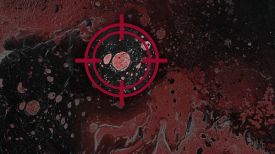Milne Group: Epigenetic Control of Gene Expression in Leukaemia and Haematopoiesis
- MRC Molecular Haematology Unit
- MRC Weatherall Institute of Molecular Medicine
- Nuffield Division of Clinical Laboratory Sciences
Aberrant epigenetic changes are a driving force in many human cancers. The focus of our lab is centred on understanding how epigenetics impacts gene regulation so that this information can potentially be used to develop new therapeutic strategies.

There has been much progress in treating human cancers, especially leukaemias, but most remain resistant to treatment. A potentially exciting approach is the development of therapies that specifically target aberrant processes in cancer cells but leave normal cells unharmed. In order to be successful, such an approach requires highly detailed information about normal and aberrant cellular processes on the molecular level, including better understanding the heterogeneity of leukaemia samples in patients.
Our lab studies epigenetic changes in leukaemia with a specific focus on the DNA/protein complex termed chromatin. Key components of chromatin include histone proteins, and the basic subunit of chromatin is the histone/DNA complex termed the nucleosome. Histones can have chemical modifications or “marks” attached to them that can impact gene activation or repression, in part through the binding of other chromatin proteins. It is becoming clear not only that aberrant epigenetic changes are common in many human diseases such as leukaemia, but that these changes by their very nature are reversible. A great number of epigenetic proteins that have been implicated in human disease have also turned out to be enzymes that are involved in adding (“writing”), removing (“erasing”) or interpreting (“reading”) histone marks. Chromatin proteins have become key therapeutic targets but it is still not fully understood how these proteins function in the cell on a molecular level.
Our current hypothesis in the lab is that aberrant epigenetic alterations at enhancers impact transcription factor binding patterns thus contributing to aberrant gene expression patterns in immune system cells as well as in leukaemia cells. We are particularly interested in a rare subset of leukaemias cause by mutations in the Mixed Lineage Leukaemia (MLL) gene that cause incurable leukaemias in children. A current popular concept in the field is the idea that transcription factors and key chromatin proteins form phase condensates in the nucleus, and that this contributes to enhancer function and gene activation. Recent work in the Milne lab has shown that disruption of chromatin proteins throught to be involved in phase condensate formation impacts gene expression without disrupting enhancer promoter interactions (Crump et al 2021 and Figure 1). Instead, we see an impact of the histone modification lysine 79 methylation on the control of enhancer promoter interactions, possibly due to impacts on transcription factor binding (Godfrey et al 2019).
Other work in the lab has helped us identify novel therapeutic targets. This includes CD133 as a possible novel immunotherapeutic target (Godfrey et al 2021 and Figure 2), as well as overexpression of the BCL-2 gene revealing a specific sensitivity of MLL leukaemais to the drug venetoclax (Benito et al 2015 ). As well as better understanding enhancer function, current work in the lab involves a long-term collaboration with the Roberts and Roy labs to develop novel models of high risk paediatric leukaemias (Rice et al 2020), and to better understand the gene regulatory networks that contribute to leukaemogenesis (Harman et al 2020).
Our lab is inherently collaborative and uses a range of cutting edge technologies. This includes state of the art techniques for the analysis of gene regulation (ATAC-seq, ChIP-seq, Capture C, nascent RNA-seq), advanced molecular biology, genome editing, and computational biology.
Lab alumni
Dr Marta Tapia
Dr Jon Kerry
Dr Ross Thorne
Dr Laura Godfrey
Deanne Gracias
Dr Erica Ballabio
Dr Max Jamilly
Dr Yale Michaels
Industry links
Links and information about a new spinout company coming soon, Dark Blue Therapeutics






